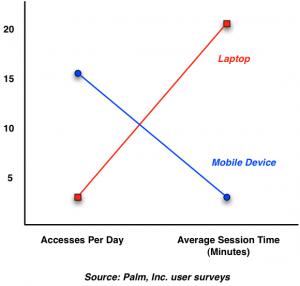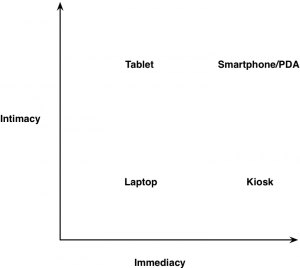I’ve been wrestling with the difference between the smartphone (or PDA, aka the ‘pod’) versus a tablet (aka the ‘pad’), and it occurred to me that one way to think about it might be to distinguish between ‘intimacy’ and ‘immediacy’.
 By immediacy, I’m talking about how you use the devices. As Palm documented a long time ago, you use laptops only a few times per day, but for long periods of time. Whereas you use mobile devices many times a day for quick access. Tablets are actually more used like laptops in this respect. You don’t tend to whip your tablet out, answer a quick question, and put it away. The size tends to make it awkward to whip in and out, and instead is more amenable to using for a period of time. Of course, smaller tablets may bridge the gap.
By immediacy, I’m talking about how you use the devices. As Palm documented a long time ago, you use laptops only a few times per day, but for long periods of time. Whereas you use mobile devices many times a day for quick access. Tablets are actually more used like laptops in this respect. You don’t tend to whip your tablet out, answer a quick question, and put it away. The size tends to make it awkward to whip in and out, and instead is more amenable to using for a period of time. Of course, smaller tablets may bridge the gap.
By intimacy, I mean the relationship to the device. As Judy Brown defines a mobile device, it’s small enough to fit in your pocket, has a battery to last all day, and you really know it. I’m particularly picking up on the latter, and moreover, that you can customize it. David Pogue has opined that it’s not really the smartphone that matters, but rather the ‘app phone’, and I think it’s important that you can optimize the device by loading it with capabilities that accessorize your brain. Though you can add ringtones, and even some apps (via, for instance, Brew), it’s much harder to augment your capabilities without a rich market of differentiated programs.
There’s more. For one, the smaller screen means you have the device closer. Laptops are inherently at arms length (or at least forearm’s length), to effectively use a keyboard. The smaller screen of a mobile device invites it closer, as does the small keyboard, using thumbs instead of the whole hand. A touchscreen interface also invites a different relationship.
 This gives me a framework for distinguishing between the devices. A laptop, even if customized by your applications, isn’t intimate, and by size isn’t used with immediacy. Tablets are intimate, but not immediate. Smartphones are intimate and immediate. Finally, there’s the category of immediate but not intimate. This might be the use of a touchscreen kiosk you find at a public spot or in a museum, or perhaps also using someone else’s device for a quick access.
This gives me a framework for distinguishing between the devices. A laptop, even if customized by your applications, isn’t intimate, and by size isn’t used with immediacy. Tablets are intimate, but not immediate. Smartphones are intimate and immediate. Finally, there’s the category of immediate but not intimate. This might be the use of a touchscreen kiosk you find at a public spot or in a museum, or perhaps also using someone else’s device for a quick access.
This seems to give me a handle on thinking about the differences between tablets and smartphones & PDAs (I think the iPod touch is a great device, say for kids in schools). Does it work for you?
I guess I struggle to find the difference in intimacy created by downloading custom apps for a handheld, and downloading custom applications for a bigger device. If anything, it seems like a laptop is far more customisable, simply by virtue of the larger virtual space that you can re-arrange however you like, and the wider range of options.
Overall though, I’d definitely agree with the fact that handhelds are a more intimate experience. I’d have guessed that that intimacy was actually tied to the immediacy of its use; the ubiquity of its presence in your life, and the fact that you’ll pop it out to help you do things you’re already doing, rather than unpack it to start doing something on it. In fact, I find tablets very cold and sterile – just the opposite of intimate. To me, its just a box of toys; they may be my toys, personally chosen by me, but there’s nothing personal about the box itself. But thats because I don’t use it day-to-day for much; its not the place where I live. The place where I live is my desktop, which is therefore elaborately customised and feels like home. It sounds like you use your tablet all the time – even if not so frequently as your handheld – so the immediacy might create a sense of intimacy with it. Both intimacy and immediacy are definitely important, and as you say useful handles for understanding the experience, but I’m not sure that they’re independent – or at least entirely independent – variables.
It certainly begins to work for me, yes. It reminds me of a workshop I attended back in 1993/94 at an interactive tv conference about the difference between the brave new world of PC based entertainment (coming soon on CD-ROM) – referred to then as deskware – and the (coming not so soon) world of interactive television – sofaware. The misunderstanding between these two quite different types of entertainment and how they might be used resulted in many millions of pounds being spent creating strange documentary/entertainment titles for the PC (which never sold) and, on the other hand, television based info products that were simply not a competitor for the PC, even then. I think we have learned this lesson many times since then. I hope so.
Rob, I agree that you can customize your laptop (well, if it’s yours, if it’s the org’s, sometimes IT has a problem with that :). But then you still have that ‘arms distance’ relationship. And you’re not that representative, having a much deeper understanding of the underlying software and a job that requires a more custom workspace.
Andrew, I think no one at the time really anticipated the WWW. We were using the internet for Usenet and WAIS, but the transition to the WWW was a major inflection point.
Just thinking that given the number of people accessing the web through mobile, for instance, is a game changer.
Finally, someone on twitter thought that the kiosk was a stretch. Perhaps, but it’s an interface you might find available as you wander: you might jump in and use it with a touch screen interface, but you’ll puzzle over the design a bit, and you’ll move on. Maybe it was a stretch, but couldn’t think of what else might qualify in that space.
Perhaps the kiosk idea isn’t too far off the mark. Waiting around in an airport recently, I was surprised at the number of iPads built into restaurant tables. Also hotel rooms, taxis – they’re popping up everywhere.
We’re used to Gmail etc on a public kiosk, but what about a full operating system profile on the move? Both Mac OS Lion and forthcoming Windows 8 provide roaming ‘profiles in the cloud’. In this way public screens become personalized devices. Intimacy and Immediacy again?
I agree on the marked difference in intimacy of tablet devices too – the touch input method, the way you hold it (as opposed to sitting down at a laptop), fully personalised apps, notifications etc. After 6 months it feels far more personal than any laptop I’ve used.